
As the country grapples with its greatest financial crisis in more than 70 years, Sri Lanka has defaulted on its debt for the first time in its history.
It follows the expiration of a 30-day grace period to pay $78 million in overdue debt interest payments on Wednesday. The governor of the central bank of the South Asian nation declared the government had entered a pre-emptive default. Two of the world's largest credit rating agencies confirmed Sri Lanka has defaulted later on Thursday.
Sri Lanka Fuel, Food Crisis Adds to Debt Dilemma
When governments are unable to satisfy some or all of their debt obligations to creditors, defaults occur. It can undermine a country's image among investors, making it more difficult to borrow money on foreign markets, further eroding investor trust in its currency and economy.
Sri Lanka is attempting to restructure loans to international creditors totaling more than $50 billion to make repayment more affordable. The pandemic, rising oil prices, and populist tax cuts have all hurt the country's economy. Medicines, gasoline, and other basics were in low supply due to a chronic scarcity of foreign cash and rising inflation.
Due to the escalating problem, huge, often violent protests against President Gotabaya Rajapaksa and his family have occurred in recent weeks. The country has already begun bailout negotiations with the International Monetary Fund (IMF) and must restructure its debt deals with creditors.
An IMF spokeswoman said later on Thursday that the current round of negotiations on a prospective loan package is anticipated to wrap up on Tuesday. Sri Lanka's government has already stated that it will require up to $4 billion this year. Weerasinghe also predicted that Sri Lanka's already high inflation rate will continue to grow, BBC reported.
Sri Lanka's new prime minister warned a day earlier that his initial look into the government's accounts had shown an economic situation considerably worse than expected, and the island nation was running out of gasoline, making life increasingly difficult for its 22 million people.
Ranil Wickremesinghe, who took over as Prime Minister last week after his predecessor was forced to flee to a military camp due to huge protests, claimed on national television on Monday that the government couldn't find even $5 million to import fuel. Fuel tankers were stranded offshore in Sri Lankan waters, their cargos out of reach, due to a lack of funds.
Despite years of warnings that the governing Rajapaksa family was mismanaging the country, the dizzying velocity of Sri Lanka's economic collapse in recent months has produced economic desperation that many compare to the country's three-decade-long civil war, which ended in 2009.
The government has continued to borrow above its means to support a bloated system, a big military, and the vanity of leadership that undertook massive postwar construction projects with dubious economic justification. When tourism money dried up due to pandemic restrictions, and debt built up to unsustainable levels, the authorities exhibited little urgency in finding answers or seeking assistance.
Read Also : Russian President Vladimir Putin Punishes 2 Generals for Making Humiliation Over Ukraine Invasion Failure
New Prime Minister Blames Previous Administration
Now, a large part of the population is struggling to scratch together three meals a day, and cooking gas has been out for weeks. Hospitals are short on lifesaving medicines because pharmaceutical companies have not been paid for months.
The most damaging number in his Monday statement was his open acknowledgment of the country's declining foreign reserves, which he stated had peaked at $7.5 billion when the Rajapaksas returned to power in 2019 after a five-year absence and had since plummeted to nearly nothing, as per New York Times.
Sri Lanka's prime minister blamed the country's present situation on "the previous government." Protesters battled with police in Colombo, Sri Lanka's capital, as citizens demanded the president and new prime minister's resignations.
More than 800 individuals have been detained around the country on suspicion of looting, ransacking, and torching MPs' homes on May 9. However, human rights attorneys claim that in other cases, police are imprisoning people who were out on the streets observing the violence rather than actively participating in it, according to Yahoo News.
@YouTube
© 2025 HNGN, All rights reserved. Do not reproduce without permission.








